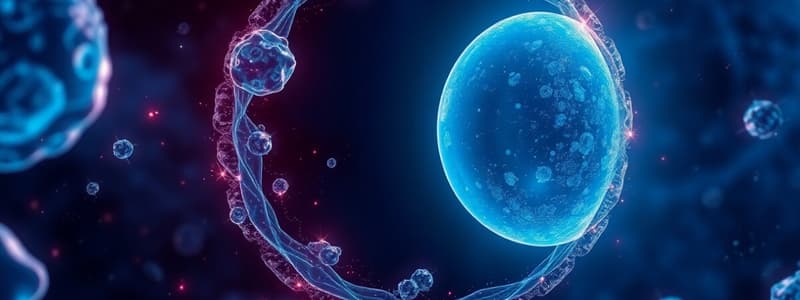Podcast
Questions and Answers
What are the two main purposes of the cell cycle?
What are the two main purposes of the cell cycle?
To accurately transmit genetic information from the mother cell to the daughter cells and maintain normal ploidy.
What is the longest phase of the cell cycle?
What is the longest phase of the cell cycle?
- M-phase
- Interphase (correct)
- G1 phase
- S phase
The restriction point is a phase in G1 where the cell decides if it will continue for another round of cell cycle or enter GO.
The restriction point is a phase in G1 where the cell decides if it will continue for another round of cell cycle or enter GO.
True (A)
Chromosomes are duplicated during the S phase of the cell cycle
Chromosomes are duplicated during the S phase of the cell cycle
What is the name of the protein that plays an important role in regulating the cell cycle at the G1/S checkpoint?
What is the name of the protein that plays an important role in regulating the cell cycle at the G1/S checkpoint?
What is the name given to the complex formed by the combination of a cyclin and a cyclin-dependent kinase?
What is the name given to the complex formed by the combination of a cyclin and a cyclin-dependent kinase?
Autophagy can act as both a tumor suppressor and promoter of tumor formation
Autophagy can act as both a tumor suppressor and promoter of tumor formation
What is the name of the process that leads to uncontrolled cell death and can damage surrounding tissues?
What is the name of the process that leads to uncontrolled cell death and can damage surrounding tissues?
What are the three types of cell death or process that involve cell death?
What are the three types of cell death or process that involve cell death?
Flashcards
Labile Cells
Labile Cells
Cells that constantly divide and have a high turnover.
Stable Cells
Stable Cells
Cells that rarely divide under normal conditions but can re-enter the cell cycle.
Permanent Cells
Permanent Cells
Cells that permanently exit the cell cycle and cannot regenerate.
Cell Cycle Phases
Cell Cycle Phases
Signup and view all the flashcards
Interphase
Interphase
Signup and view all the flashcards
G1 Phase
G1 Phase
Signup and view all the flashcards
S Phase
S Phase
Signup and view all the flashcards
G2 Phase
G2 Phase
Signup and view all the flashcards
M Phase
M Phase
Signup and view all the flashcards
Mitosis
Mitosis
Signup and view all the flashcards
Cytokinesis
Cytokinesis
Signup and view all the flashcards
Restriction Point (R-point)
Restriction Point (R-point)
Signup and view all the flashcards
Cell Cycle Checkpoints
Cell Cycle Checkpoints
Signup and view all the flashcards
Cyclin-dependent kinases (CDKs)
Cyclin-dependent kinases (CDKs)
Signup and view all the flashcards
Cyclins
Cyclins
Signup and view all the flashcards
Oncogenes
Oncogenes
Signup and view all the flashcards
Tumor Suppressor Genes
Tumor Suppressor Genes
Signup and view all the flashcards
Apoptosis
Apoptosis
Signup and view all the flashcards
Necrosis
Necrosis
Signup and view all the flashcards
Autophagy
Autophagy
Signup and view all the flashcards
Caspases
Caspases
Signup and view all the flashcards
G0 phase
G0 phase
Signup and view all the flashcards
Study Notes
Cell Cycle and Cell Death
- Cells are categorized into labile, stable, and permanent types based on their division rates and ability to regenerate.
- Labile cells divide frequently (epithelial, hematopoietic, germ cells).
- Stable cells normally don't divide but can be stimulated (hepatocytes, renal tubular cells).
- Permanent cells do not divide (neurons, cardiomyocytes).
Cell Cycle Phases
- The cell cycle consists of interphase (non-dividing) and M-phase (mitotic phase).
- Interphase is subdivided into G1, S, and G2 phases.
- G1 phase involves cell growth and organelle duplication.
- S phase is for DNA replication, doubling the genetic material, but not the chromosome number.
- G2 phase is for further cell growth and checking for DNA replication errors.
- The M-phase includes mitosis (nuclear division) and cytokinesis (cytoplasmic division).
- Cell division duration varies widely between cell types; G1 phase duration is generally variable.
- Some cells leave the cell cycle and enter the G0 phase, a resting state.
- The restriction point (R-point) is the decision point in G1 where the cell commits to division or enters G0.
Main Purpose of Cell Cycle
- Accurate transmission of genetic information from the mother cell to daughter cells.
- Maintaining normal ploidy; humans are diploid.
Somatic Cell Division
- Interphase is 95% of the cell cycle, focusing on growth and DNA replication..
- Mitosis comprises prophase, prometaphase, metaphase, anaphase, and telophase.
- Cytokinesis is the division of the cytoplasm.
Cell Cycle Regulation
- Cell cycle length varies by cell type.
- Checkpoints are control points that check for DNA integrity during the cell cycle's G1/S, S, and G2/M phases.
- Retinoblastoma protein (Rb) plays a critical role at the G1/S checkpoint.
- Cyclins and cyclin-dependent kinases (CDKs) are key regulators, with CDKs inactive unless bound to cyclin.
- CDKs exert effects through phosphorylation.
- The R-point depends on the status of DNA material, and is growth-factor dependent.
- Growth factors allow progression through the cell cycle; TGF-ß blocks this.
Proto-oncogenes and Tumor Suppressor Genes
- Proto-oncogenes promote cell cycle progression.
- Mutations in proto-oncogenes transform them into oncogenes, leading to uncontrolled division.
- Tumor suppressor genes prevent uncontrolled division, and mutations in them contribute to uncontrolled cell division.
Cell Death Mechanisms
- Apoptosis is programmed cell death, essential for development, tissue homeostasis, and damaged cellular elimination.
- Necrosis is an uncontrolled process due to severe injury/stress, causing inflammation and cellular damage.
- Autophagy involves the cell's degradation and recycling of components.
- Pyroptosis is another form of programmed cell death; it is characterized by inflammation.
- There are numerous cellular functions and disorders associated with these mechanisms.
Studying That Suits You
Use AI to generate personalized quizzes and flashcards to suit your learning preferences.



